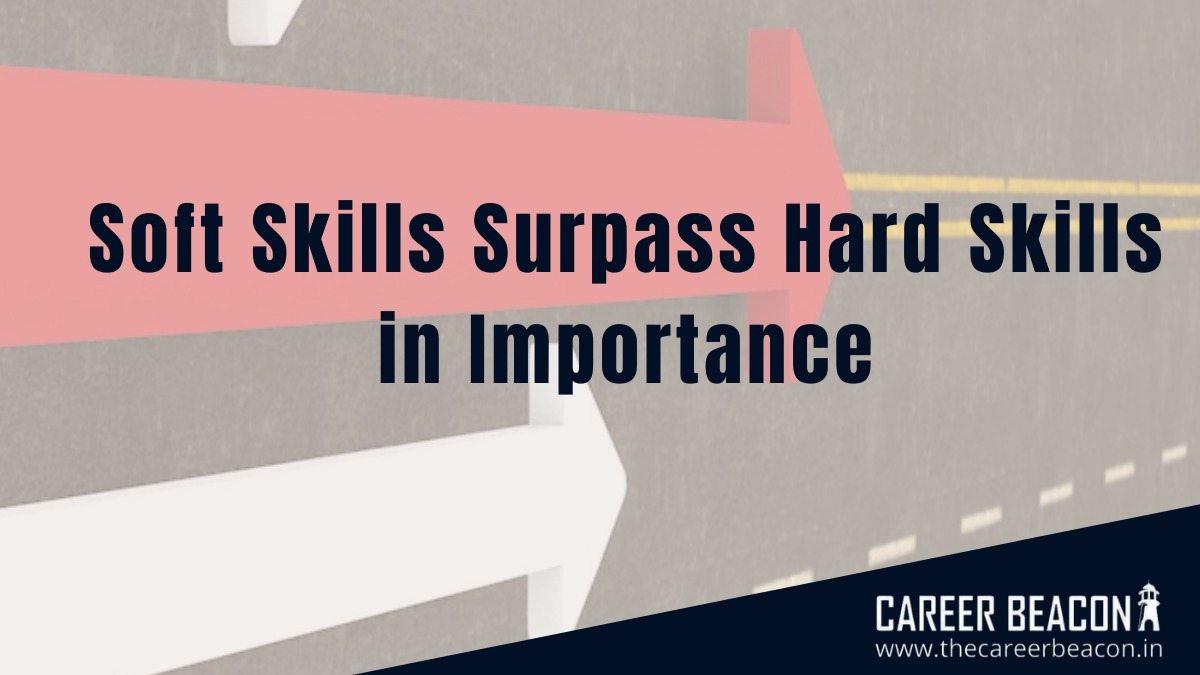
Soft Skills Surpass Hard Skills in Importance
In earlier times, hard skill ( coding, graphic designing, finances etc) were given utmost importance for hiring a new employee. But, tables have turned now. Along with hard skills, organizations also look for soft skill in a potential employee. Infact, soft skills sometimes surpasses the importance of Hard skills.
When hiring for a new employee in a specific job profile, employer check required skill sets in any applicant.
What is a Soft Skill?
Soft skill can be defined as abilities which are part of one’s personality. They are not unique to any job, rather are traits of a good employee. Communication skills, problem solving, leadership skills are some of the instances of soft skills.
Nowadays, organizations are looking for individuals who have both hard skills and soft skills. Soft skills are result of different life experiences of an individual and one cannot show their proficiency in a soft skill unlike hard skills as they are not backed up by any kind of certification.
Various Soft Skills
Different types of soft skills are discussed below:
CREATIVITY
As the name suggests, creativity refers to ability to create. It involves understanding, analyzing and solving a problem in an innovative way. Employers want there employee to apply their innovative mindset so as to solve various problems arising in any business.
COMMUNICATION
Communication refers to delivering an idea to the listener and make them understand about one’s thought. It has the power to influence people’s thoughts and their behaviour towards a particular idea. This is one of the most important soft skills an employer looks for in any resume.
ADAPTABILITY
This is an individual’s ability to adjust in an environment’s changing conditions. Environment is dynamic, and businesses survive if they adapt those changes. So, for that reason they need their employees to be adaptive to upcoming changes.
EMOTIONAL INTELLIGENCE
Individuals have to work in different peer groups. It is necessary for them to be emotionally stable and respect emotions of their peers as well.
Hard vs Soft Skills
• Hard skills are skills which are acquired by particular training over a period of time, whereas, soft skills are personality traits of an individual which they acquired through various life experiences.
• Where on one hand , hard skills are industry specific and are demanded as per the requirements of a particular industry, on the other hand, soft skills are transferable across almost all industries.
Soft Skills’ Value in a Resume
Today’s recruiters not only see an applicant’s hard skills , but, also focus on the soft skills they acquire. They are very much concerned about how well a potential employee will be able to adjust and perform in an organization’s work culture. There are certain job profiles that give more emphasis on soft skills than hard skills. Jobs with client interaction demand for an individual who possess good communication skills and those working in human resource sectors also need to possess this skill and should have innovative minds, should be able to understand employee’s emotions in addition.
In case , where every applicant possesses similar hard skills, soft skills would help to stand out one’s resume.
How to mention Soft Skills in Resume
Before taking personal interviews, employers go for resume screening. Providing an appealing resume will increase the chances to clear the resume screening process. In order to stand out, one needs to highlight there soft skills in their resume.
Hard skills and soft skills must be highlighted in different sections of a resume. This will allow the recruiter to get a brief knowledge about applicant.
Nobody takes much time on a single resume. Employers have to screen hundreds and thousands of resumes. So, one must highlight there key points so as to be considered a right fit.
On a concluding note, we can say that types of skills required in any particular job depends upon the nature of that industry. But, soft skills are transferable across industries, which make them beneficial over hard skills. We should keep in mind that soft skills are not replacement of Hard skills.
When hiring for a new employee in a specific job profile, employer check required skill sets in any applicant.
In earlier times, hard skills ( coding, graphic designing, finances etc) were given utmost importance for hiring a new employee. But, tables have turned now. Along with hard skills, organizations also look for soft skills in a potential employee. Infact, soft skills sometimes surpasses the importance of Hard skills.
What is a Soft Skill?
Soft skills can be defined as abilities which are part of one’s personality. They are not unique to any job, rather are traits of a good employee. Communication skills, problem solving, leadership skills are some of the instances of soft skills.
Nowadays, organizations are looking for individuals who have both hard and soft skills. Soft skills are result of different life experiences of an individual and one cannot show their proficiency in a soft skill unlike hard skills as they are not backed up by any kind of certification.
Various Soft Skills
Different types of soft skills are discussed below:
CREATIVITY
As the name suggests, creativity refers to ability to create. It involves understanding, analyzing and solving a problem in an innovative way. Employers want there employee to apply their innovative mindset so as to solve various problems arising in any business.
COMMUNICATION
Communication refers to delivering an idea to the listener and make them understand about one’s thought. It has the power to influence people’s thoughts and their behaviour towards a particular idea. This is one of the most important soft skills an employer looks for in any resume.
ADAPTABILITY
This is an individual’s ability to adjust in an environment’s changing conditions. Environment is dynamic, and businesses survive if they adapt those changes. So, for that reason they need their employees to be adaptive to upcoming changes.
EMOTIONAL INTELLIGENCE
Individuals have to work in different peer groups. It is necessary for them to be emotionally stable and respect emotions of their peers as well.
Hard vs Soft Skills
• Hard skills are skills which are acquired by particular training over a period of time, whereas, soft skills are personality traits of an individual which they acquired through various life experiences.
• Where on one hand , hard skills are industry specific and are demanded as per the requirements of a particular industry, on the other hand, soft skills are transferable across almost all industries.
Soft Skills’ Value in a Resume
Today’s recruiters not only see an applicant’s hard skills , but, also focus on the soft skills they acquire. They are very much concerned about how well a potential employee will be able to adjust and perform in an organization’s work culture. There are certain job profiles that give more emphasis on soft skills than hard skills. Jobs with client interaction demand for an individual who possess good communication skills and those working in human resource sectors also need to possess this skill and should have innovative minds, should be able to understand employee’s emotions in addition.
In case , where every applicant possesses similar hard skills, soft skills would help to stand out one’s resume.
How to mention Soft Skills in Resume
Before taking personal interviews, employers go for resume screening. Providing an appealing resume will increase the chances to clear the resume screening process. In order to stand out, one needs to highlight there soft skills in their resume.
Hard skills and soft skills must be highlighted in different sections of a resume. This will allow the recruiter to get a brief knowledge about applicant.
Nobody takes much time on a single resume. Employers have to screen hundreds and thousands of resumes. So, one must highlight there key points so as to be considered a right fit.
On a concluding note, we can say that types of skills required in any particular job depends upon the nature of that industry. But, soft skills are transferable across industries, which make them beneficial over hard skills. We should keep in mind that soft skills are not replacement of Hard skills.


